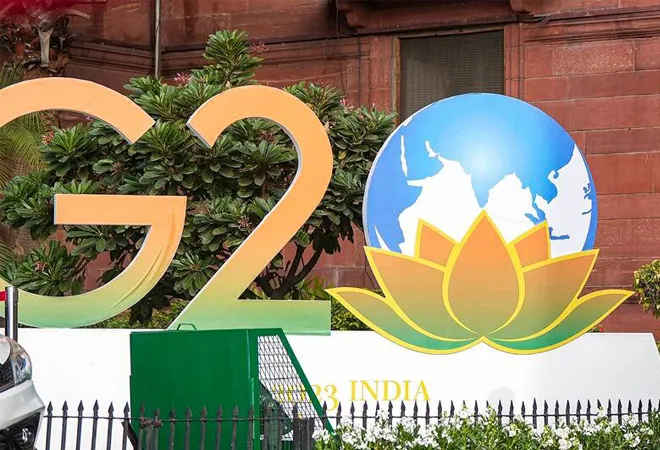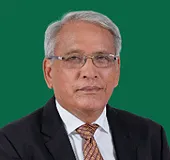-
CENTRES
Progammes & Centres
Location
Global economic cooperation and recovery will be key to India’s G20 agenda

This article is part of the series—Raisina Edit 2023
The outlook for the world economy is, most recently, projected to deteriorate. The World Bank’s January Global Economic Prospects downgrades growth rate for the world and almost all the G20 countries. World trade is also projected to slow down substantially, depriving the world of one of the most essential sources of growth. This weakening projection adds to the complexity of issues that G20 India and related engagement groups, including the Think20, are forced to contend with.
The debt crisis in highly indebted developing countries may worsen, unless reduction can be effectively agreed upon among creditors, for which concrete progress is needed in the G20’s Common Framework.
The Financial Crisis that gave birth to the G20 15 years ago may not look threateningly acute this year. However, there are signs of inflation being de-anchored in some countries. Monetary policy profile is likely to get tighter in the months ahead. In its wake, the debt crisis in highly indebted developing countries may worsen, unless reduction can be effectively agreed upon among creditors, for which concrete progress is needed in the G20’s Common Framework. Secondly, very little has changed in the International Financial Architecture, as compared to the extent and depth of shifts in the relative weights of the dominant founders of the Bretton Woods system, and the rest of the world in general and the emerging economies in particular. What some people call “Bretton Woods 2.0” remains a distant dream. Thirdly, the vulnerability of capital flows to even the slightest reversal of policy signals—a phenomenon which is widely known as flight to safety—underline the imperative of a co-ordinated regulation, which financial centres dislike. Considering the centrality of crisis management, and financial crisis management in particular, to the G20 process, financial reform will continue to rank very prominently in the G20 agenda under India’s presidency and beyond.
Economic recovery programme under India’s G20 Presidency
Orchestrating a concerted recovery programme under India’s Presidency of the G20 deserves to be elevated in the G20 agenda. Designing such a recovery programme and mobilising credible support to it is a painstaking task under the current global cooperation landscape, where major countries are involved directly or indirectly in conflicting relations. We have witnessed how Central Banks around the world altered policy direction with little regard to cross-border cooperation. We are also aware of the limited fiscal space facing all governments in the aftermath of the huge financial stimuli during the COVID-19 pandemic. Ingenuity and strong cooperative spirit are needed on the parts of senior officials and ministers in drafting such a policy package.
On the “Synaptic”, the rendezvous with crypto technologies has indicated the massive force of connectivity inherent therein.
Even if one agrees to assign the G20 crisis management, particularly in the realm of finance, as a core mandate, the effectiveness of such management requires progress of cooperation in many other areas. The way Sherpa issues have proliferated in successive G20 presidencies appears to have become burdensome. However, finance initiatives of the G20 are targeted at global stability and recovery. Addressing issues of cross-border data transmissions is imperative. This brings us to the issues of openness of trade and investment, at the least, with all derivative issues related to them.
Technology and border policies
Of the quandaries facing the world in the last 30 years or so—since the conclusion of the Uruguay Round and the establishment of the World Trade Organization (WTO)—the opposing directions of change in technology progress and border policies is of note. Technology progress is making human lives closer and closer connected. A lot more of these connectivity forces now reside at the innovation frontiers waiting to be adopted and diffused through a rapid and accelerating speed. In the area of “Cosmic” technologies, there looms large integrated circuits at 7 NM or less, quantum computing, Internet of Things, additive manufacturing, electric and autonomous vehicles, to mention a few. On the “Genetic” front, genome editing is opening huge opportunities in food agriculture, animal and human health, and energy aided by editing machines such as CRISPR/Cas9. On the “Synaptic”, the rendezvous with crypto technologies has indicated the massive force of connectivity inherent therein. Lastly, on the “Memetic” front, digitalisation of everything that there is on earth, including the unimaginably diverse human cultures, has seeded an immense memetic industry that includes “travelling” without physical movement. Let us not forget how technology has always served as the dominant force of change in human culture. Despite occasional diabolic uses, as in war and toxic footprints as in global warming, technology progress has brought homo sapiens to the current frontier of existence. The speed at which the progress permeates societies and citizens therein may differ. Some citizens are innovators; some others prefer to follow rather than to pioneer; and some may even choose to be laggards. Yet, on the whole, technology progress has elevated human culture in a positive way.
Recovery, reform of international financial institutions, de-escalation of trade conflicts, and functional cooperation in frontier technologies will understandably make only part of the agenda for G20 India and related engagement groups.
The story about border opening is less straight forward. No major package of global opening of trade investment has been agreed upon in the last 30 years or so. Leaders seem to have been content with the regional approach, which is reflected in the many regional free trade and investment agreements, or comprehensive partnership agreements signed in recent times including some that go spatially far beyond one region. In parallel with the regional initiatives, trade conflicts, trade sanctions, and economic warfare have heightened. The technology protectionism or technology mercantilism aimed at disabling progress of key technologies, not just dual-use technologies, by way of denial and other forms of sanction, is particularly worrying. Escalation of conflict in the semiconductor industry is a case in point. It can easily cross over to other frontier technologies, such as quantum computing, if leaders intensify their rhetoric against openness. In a world where major players harden nationalistic tones, the G20 leaders are challenged to pursue “second best” agreements of sub-global nature, be they spatial or industrial, and to maximise the globality of such agreements as stipulated in Article XXIV of the WTO Agreement with due consideration to Part IV of the same agreement. Only an open world economy, however imperfect, would allow G20-driven recovery to get transmitted to the rest of the world. Recovery, reform of international financial institutions, de-escalation of trade conflicts, and functional cooperation in frontier technologies will understandably make only part of the agenda for G20 India and related engagement groups. Progress in the realisation of climate change and biodiversity commitments are of no less importance. However, the less encouraging economic outlook and the worrying escalation of trade, investment, and technology conflicts justifies that greater emphasis is given to recovery and its transmission to the G20 countries and beyond.
The views expressed above belong to the author(s). ORF research and analyses now available on Telegram! Click here to access our curated content — blogs, longforms and interviews.

Djisman Simandjuntak is a senior economist and Chair of the Board of Directors of CSIS Foundation Indonesia. He has worked on a wide array of ...
Read More +